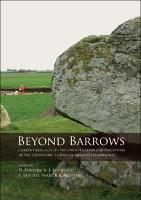Beyond barrows
Current research on the structuration and perception of the Prehistoric Landscape through Monuments
Contributor(s)
Fontijn, David (editor)
Louwen, Arjan (editor)
van der Vaart-Verschoof, Sasja (editor)
Wentink, Karsten (editor)
Collection
Dutch Research Council (NWO)Language
EnglishAbstract
Europe is dotted with tens of thousands of prehistoric barrows. In spite of their ubiquity, little is known on the role they had in pre- and protohistoric landscapes. In 2010, an international group of archaeologists came together at the conference of the European Association of Archaeologists in The Hague to discuss and review current research on this topic. This book presents the proceedings of that session.
The focus is on the prehistory of Scandinavia and the Low Countries, but also includes an excursion to huge prehistoric mounds in the southeast of North America. One contribution presents new evidence on how the immediate environment of Neolithic Funnel Beaker (TRB) culture megaliths was ordered, another one discusses the role of remarkable single and double post alignments around Bronze and Iron Age burial mounds. Zooming out, several chapters deal with the place of barrows in the broader landscape. The significance of humanly-managed heath in relation to barrow groups is discussed, and one contribution emphasizes how barrow orderings not only reflect spatial organization, but are also important as conceptual anchors structuring prehistoric perception. Other authors, dealing with Early Neolithic persistent places and with Late Bronze Age/Early Iron Age urnfields, argue that we should also look beyond monumentality in order to understand long-term use of “ritual landscapes”.
The book contains an important contribution by the well-known Swedish archaeologist Tore Artelius on how Bronze Age barrows were structurally re-used by pre-Christian Vikings. This is his last article, written briefly before his death. This book is dedicated to his memory.
Keywords
barrows; prehistory; EuropePublisher
Sidestone PressPublisher website
https://www.sidestone.com/Publication date and place
2013Classification
History
Archaeology


 Download
Download